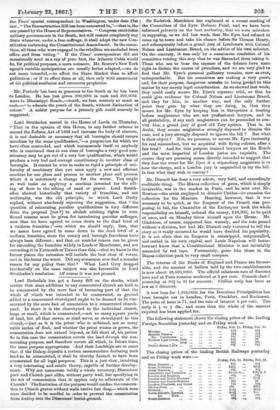Lord Redesdale has got a funny Bill on the stocks,
which recites that since additions to any consecrated church are held to be consecrated by the mere fact of becoming part of that the whole of which was intended to be consecrated, so ground added to a consecrated churchyard ought to be deemed to be con- secrated by the mere fact of annexation to a consecrated church- yard. In short it is the churchyard to the individual church, large or small, which is consecrated,—not so many square yards of land, but all that serves, or shall serve, as churchyard to this ehurch,—just as it is the priest who is ordained, not so many cubic inches of flesh, and whether the priest wastes or grows, the consecration does not extend beyond, or fall short of, his person. So in this case the consecration covers the land through the con- secrating purpose, and therefore covers all which, in future time, the same purpose appropriates. And their Lordships are to enact that if thd Bishop deposits a certain memorandum declaring such land to be consecrated, it shall be thereby deemed to have been consecrated for all legal purposes. This is a just view, involving a very interesting and subtle theory, capable of further develop- ment. Why not consecrate boldly a whole cemetery, Dissenters' part and Church part able, without party wall, but specifying in the act of consecration that it applies only to adherents of the Church? The limitation of the purpose would confine the consecra- tion to Church graves without walls twelve feet deep,— which were once decided to be needful in order to prevent the consecration from leaking into the Dissenters' burial-ground. Sir Roderick Murchison has explained at a recent meeting of the Committee of the Eyre Defence Fund, and we have been informed privately on the best authority, that we were mistaken in supposing, as we did last week, that Mr. Eyre had refused to come up to town and take his chance before Sir Thomas Henry, and subsequently before a grand jury of Londoners with Colonel Nelson and Lieutenant Brand, on the advice of his own solicitor. On, the oontrary, it was only by a unanimous resolution of his committee vetoing this step that he was dissuaded from taking it. Those who are to bear the expense of the defence have some right to dictate the course of procedure, and we are very glad to find that Mr. Eyre's personal gallantry remains, now as ever, unimpeachable. But his committee are making a very great, and, for their purpose, dangerous mistake in being guided in this matter by any merely legal consideration. As we showed last week, they could. easily secure Mr. Eyre's separate trial, so that he could give evidence for Colonel Nelson and Lieutenant Brand, and they for him, in another way, and the only further point they gain by what they are doing, is, that they secure for Mr. Eyre by keeping him in Shropshire a hearing before magistrates who are not professional lawyers, and ia all probability, if any such magistrates can be persuaded to con- vict him, a grand jury of good old Tory squires. That is, no doubt, they secure magistrates strongly disposed to dismiss the case, and a jury strongly disposed to ignore the bill ? But what is their object? Not, we presume, to secure Mr. Eyre immunity for real misconduct, but an acquittal with flying colours, after a fair trial? And for this purpose trained lawyers on the Bench and the most impartial of London juries are requisite. The course they are pursuing seems directly intended to suggest that they fear the worst for Mr. Eyre if a stipendiary magistrate is to hear the charge, and a London jury is empanelled to try the bill. Is that what they wish to convey?






























 Previous page
Previous page